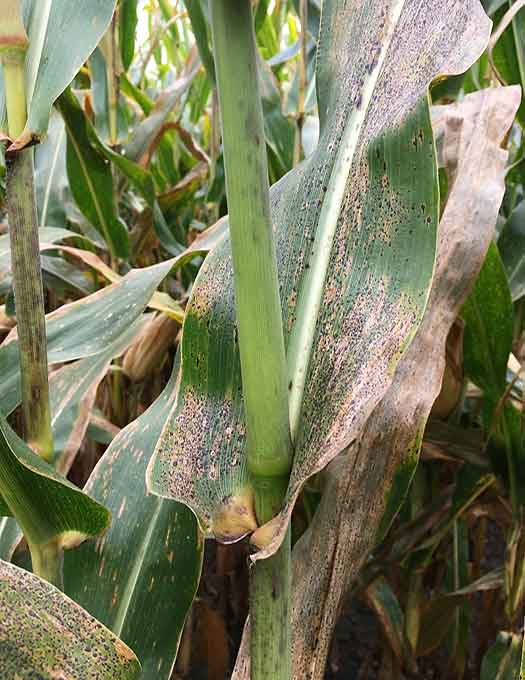 Tar spot is a fungal leaf disease that infects corn leaves and causes lodging and yield losses. First confirmed in 2015, it has rapidly spread in persistence and reach. Yield losses from tar spot infection can be severe. Where no fungicides were used, yield reductions of 10-40 bushel per acre have been reported. Reduced photosynthesis causes poor kernel fill and ear fill, loose kernels and vivipary (kernels sprouting while still on the cob), and increased stalk lodging.
Tar spot is a fungal leaf disease that infects corn leaves and causes lodging and yield losses. First confirmed in 2015, it has rapidly spread in persistence and reach. Yield losses from tar spot infection can be severe. Where no fungicides were used, yield reductions of 10-40 bushel per acre have been reported. Reduced photosynthesis causes poor kernel fill and ear fill, loose kernels and vivipary (kernels sprouting while still on the cob), and increased stalk lodging.
Raised black structures called ascomata appear on leaves and may also be present on leaf sheaves and ear husks. These symptoms may be confused with common and southern rust symptoms; however, Tar Spot lesions may have a tan border and can’t be rubbed off the leaf surface. It is generally agreed that most U.S. corn hybrids are susceptible to the disease. There is no particular genetic background showing more tolerance to the disease.
 Tar Spot typically has a latency period (point of infection to symptom development) of 14-30 days when symptoms develop. This latency period can complicate fungicide timing. Pathologists confirm that the disease overwinters in crop debris similarly to Gray Leaf Spot and Northern Corn Leaf Blight. Since the disease spreads through spore dispersal, rotating corn-soy may help with infected residue management, but spores may still blow in from neighboring infected fields. Fungicide trials have demonstrated most commercial fungicides work well against Tar Spot. The key is timing of the application due to the 14-30 latency period. Scout your fields and if you see lesion development on the vegetative growth on the plant and weather forecast predicts wet weather, consider a fungicide application.
Tar Spot typically has a latency period (point of infection to symptom development) of 14-30 days when symptoms develop. This latency period can complicate fungicide timing. Pathologists confirm that the disease overwinters in crop debris similarly to Gray Leaf Spot and Northern Corn Leaf Blight. Since the disease spreads through spore dispersal, rotating corn-soy may help with infected residue management, but spores may still blow in from neighboring infected fields. Fungicide trials have demonstrated most commercial fungicides work well against Tar Spot. The key is timing of the application due to the 14-30 latency period. Scout your fields and if you see lesion development on the vegetative growth on the plant and weather forecast predicts wet weather, consider a fungicide application.